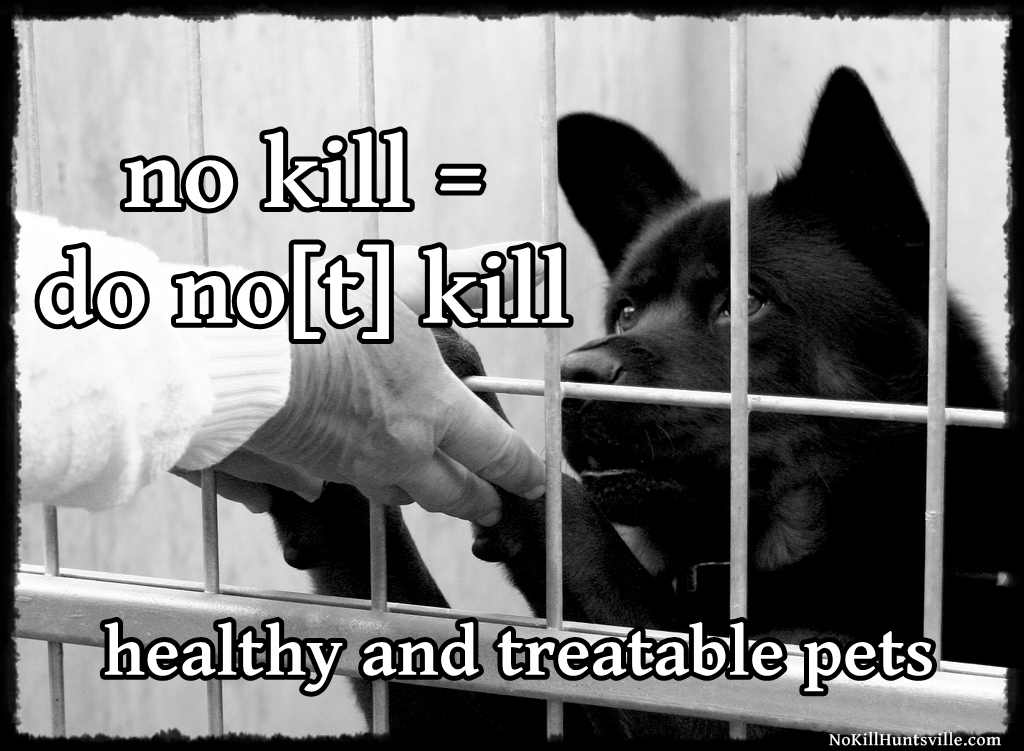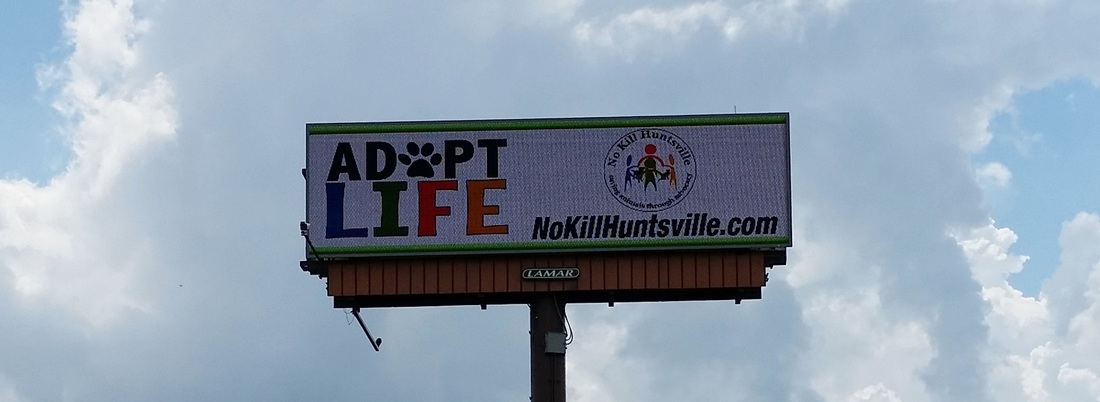|
We have not blogged on our website for almost two years. We have been in a monitoring mode during that period now that the city has changed the culture at Huntsville Animal Services, more lives are being saved than ever before and our advocacy is no longer necessary on a daily basis. This blog is a look back at what has happened a the shelter and in our community over a period of years leading up to the end of 2021. We seek shelter reports from the City Attorney's Office monthly and have for many years. The monthly and yearly shelter reports are here (and link from here). We share the euthanasia reports on our Facebook page. We took at look back at the data we have to develop a list of highlights for our followers. Huntsville Animal Services provides services to both the City of Huntsville (now the largest city in the state) and Madison County, but not the City of Madison.
Saving the lives of animals is a responsibility which falls to all of us as a community. We applaud the progress made by the shelter, hope some of our recommendations to city officials will be seriously considered in the coming year and we encourage everyone to become personally invested in the shelter operation. We simply cannot go back to a time when 10k animals entered the building each year and 2/3 of them were destroyed. That is not who we are. We can continue to improve and continue to be the Star of Alabama we call ourselves.
0 Comments
We consider the no kill movement a social movement. Although many people view what takes place in tax funded animal shelters as an "animal problem," it really is a "people problem." The reasons why animals have historically died in our shelters has everything to do with individual and collective behavior and the animals are simply the unfortunate victims of our poor choices and our poorly functioning shelter industry in our country.
Social movements are all about change. About reform. In the case of animal shelters, rare is the situation where a municipality or the board of an animal shelter engages in reflection and decides to stop destroying animals with no outside influence to do so. There is normally a tipping point which is reached due to outside influences of some kind. The path from Point A to Point B is often incredibly difficult and it involves a lot of struggle and conflict. Those who seek change on behalf of a community or in support of a cause very rarely do so seeking any form of recognition. The end goal is the focus and once that goal has been reached, they are simply grateful for the change and happy to be able to go on with their own lives. It is an unfortunate reality in the no kill movement that people revise history and they do so to the detriment of our entire society. As has been said by Ryan Clinton, the Austin Attorney who played a key role in FixAustin, "when we rewrite history, we learn the wrong lessons. And the lesson from Austin is that it was a long battle." The same could be said about a host of other communities across the country, including Huntsville. It has been a struggle and a battle which has gone on for years and that struggle is part of our history. So. Why is that important? It is important not because those involved in the struggle - the members of our coalition - seek any form of recognition for our efforts. This is not at all about credit or someone telling us what a good job we did or that we are doing. This has truly never been about us, it has always been about saving the lives of shelter pets and we honestly wish that our advocacy role had not been necessary at all. We wish the City of Huntsville had taken steps to stop killing animals back in early 2009 after learning about the no kill equation. Or that the city had accepted the offer of free and confidential help from subject matter experts back in April of 2013. Had either of those things happened, our coalition either would not have been necessary at all or we would have taken a completely different path in our efforts to help the City of Huntsville become a no kill community. We took this issue to our public only when we hit a wall in terms of cooperation and we felt we had no alternative but to go around that wall for the sake of the animals being destroyed needlessly using our money and in our name. We get email messages, calls and contacts from advocates across the country wanting to know what we did in Huntsville and how it is that the city is now saving the vast majority of animals in our shelter. It is important not to rewrite history or to sugarcoat it in any way to take out the struggle because doing so sends the wrong message and teaches people the wrong lessons. Just like Austin, the lesson from Huntsville is that this has been a battle which has gone on for years. The city didn't just suddenly decide one day that it was a terrible idea to destroy perfectly savable animals in our shelter and to stop doing that on its own. We had to push the issue and we had to stay on subject, as we are now. There are those who are revising our history here. Some of them are local and they are leaving out part of what has taken place either to make themselves look better or to make our coalition look like the bad guys for having had the audacity to say "enough." Others who are revising our history do not live or work here and are doing so in order to advance an agenda which either suits their message or which promotes a consulting organization which played a role here and which is now gaining new clients by making it sound like they came here and fixed what was broken. If you live here or work here, our message to you is this: we are not yet a no kill community. Yes, the city is doing an incredible job and has made a lot of positive changes. The city has yet to commit to ending the outdated practice of destroying healthy and treatable pets and there are issues with program development. A clear sign of that is that the shelter adopted out 183 animals in a matter of days during a recent event and promptly turned around and claimed the shelter was full again and that no incoming animals would be accepted. If you are not from here and you are trying to seek shelter reform in your own community, we encourage you to learn about the programs and services of the no kill equation. We encourage you to first reach out to local officials and try to work with them to save the lives of animals and that you do so diplomatically and respectfully. If that doesn't work and you are rebuffed, make a decision on whether or not this issue is important enough to you to potentially spend years speaking out about it, possibly to the detriment of your personal reputation and well-being. Even once you do speak out for change, we encourage you to focus not on individuals but on the leadership of the shelter. We also encourage you to remain respectful and diplomatic, even when that behavior is not reciprocated as was the case with us. If you are not from here and you are rewriting our history to leave out parts of our story, shame on you. Doing so is both arrogant and irresponsible. You cannot possible know what has transpired in our community if you have not been part of this community and played a role in change here. You do a disservice to the very causes of animal welfare you claim to support by making this process seem like it was free of conflict and that it can be replicated in some other place just by hiring a particular consultant or by being "nicer" about the message. Our story is still unfolding. We are not a no kill community and we may never be. That is entirely up Mayor Tommy Battle, the members of our city council, City Administrator John Hamilton, Shelter Director Karen Sheppard and the people who live and work here. It is entirely possible that for Huntsville, better is good enough. But please don't rewrite our history. Doing so can have adverse affects far beyond our region and in the end, it's really a little too early to stand around and pat each other on the back as long as healthy and treatable pets are still at risk at 4950 Triana Boulevard Southwest in Huntsville, Alabama. Huntsville is getting a lot of attention these days across the country as a result of the progress made at our municipal animal shelter. People who live and work here are thrilled with the progress, as they well should be. Shelter animals are now safer here than they have ever been in the history of the community as save rates have reached and then exceeded 90% of all shelter intake. Huntsville is being referred to as an example of what can happen “in the south” with a shift in focus and using the compassion which exists in an animal loving community. We are not yet a true no kill community, but we are incredibly close to a time when the city can (and should) make a public declaration of intent that healthy and treatable animals are no longer at risk here moving forward, regardless of the circumstances we may face.
It has been said that if we do not learn from history, we are bound to repeat it. It has also been said that in order to learn from history, it must be factually accurate. When we modify the sequence of events which transpired to get from Point A to Point B, we more often than not will learn the wrong lesson. For all of our applause of the city for the progress which has been made, the reality in our community is that this process has been a struggle and did not come easily. If you have been told or have heard a version of the history which led to this progress and the story begins with the city voluntarily making sweeping changes, you have been told a history which is devoid of facts and which has been sanitized. This rewriting of history has occurred related to other locations like Reno and Austin and it is not uncommon in this social movement. Perhaps it just makes a lot of people uncomfortable to think about some of the more unpleasant parts of those stories. Huntsville city officials were first introduced to the no kill philosophies we promote in late 2008 at a time when three out of every four animals entering the shelter were destroyed. By early 2013, when the city was offered free help from subject matter experts in order to do better and refused that help, more than half of the animals in the shelter were still being destroyed each year. The city's position at that time was that the shelter was doing a beautiful job and doing all it could to save lives - even when the save rate was just over 40 percent. We first took this issue to the public in the spring of 2013, having reached the conclusion that city officials were satisfied with how the animal shelter was operating. We felt it would take public pressure and demand to force the city to reconsider spending our money on death rather than on life. There will always be a degree of dispute about exactly what led to the progress we now see. There have been many factors involved in this process, not the least of which is the arrival on the scene of a new city administrator who told us in early 2014 that he supported change and that he too wanted the city to save the lives of all healthy and treatable shelter animals. We know we have had a role in the history here and firmly believe that but for our advocacy, little would have changed. The path taken to get to this point, and the particular struggles faced along the way, are not directly relevant to us here in Huntsville now that we have “arrived” for the most part. But those facts are entirely relevant to communities outside of our own which may look to our progress and wish to replicate it themselves. We do a disservice to those places if we behave as if our progress here was achieved by reaching across differences, finding common ground and all working together to seek a newer and better future. Yes, our community has achieved tremendous success. But it took years longer than it would have taken had the city simply decided to act on its own many years ago and without the necessity of a group like ours to demand accountability from the city, a process which has taken a great toll on everyone involved. Make no mistake - this is not about credit. We have always said that we seek to become irrelevant as a coalition not because we are being ignored, but because we are no longer needed to be boat rockers for community change. We have sat silently on the sidelines while others have taken credit for the changes which have been made here and we plan to continue to do just that. Why? Because this is not at all about people and patting each other on the back and it is very much about saving lives. But this is also about being honest about our history here so that others can learn from it and perhaps avoid some of the conflict we endured. Much of what took place here was unproductive and led to a higher body count. A time will come in the history of our country when all municipal shelters are no kill shelters and all communities are no kill communities because that is what the public wants and will demand. We encourage any community outside of our own which is looking at our progress to take proactive steps to get ahead of this issue and make change voluntarily. Listen to the advocates and animal lovers who come to you with ideas, enthusiasm, research and help. They often know much more about the subject than you may imagine and it is likely they are networked with subject matter experts who can guide and help your community to achieve change not in years but in weeks or months. Invest your time and focus into doing what is right so that energy is spent not on struggle and conflict, but on saving the lives of the animals we say we love and value. When city officials were first introduced to the no kill programs we promote in equation form in late 2008, the live release rate at our municipal shelter was 25%. Three out of every 4 animals were destroyed regardless of health or disposition. When we formed our coalition in early 2012, the live release rate had risen to 34%. We consider this a dismal number and are truly glad it is now just part of the past
The live release rate at the municipal shelter was over 96% in the month of October and we suspect the November numbers will be similar, This is a stellar achievement and one which should be a great source of pride for local elected and appointed officials, city employees, rescuers, volunteers and the animal-loving public. Just a few short years ago, many in our community felt we just could not do better for whatever reason. Time has proven that position to be wrong. As has been the case in many communities brave enough to try something new, time has proven that we are, in fact, capable of change and that our community is, in fact, compassionate enough to make better choices. More than 100 shelter animals were adopted out in a single day on November 30th. When a bed drive was launched to help shelter dogs, the goal of 80 beds was met in less than 4 business days. Those facts alone say a lot about our community and the capacity for greatness. The road to change is never easy. It comes with conflict, lost sleep, hurt feelings and in the case of the no kill movement, it often results in a great deal of opposition. This may seem illogical to many of you. As we were asked at our no kill workshop in the summer of 2013 at the downtown library, "who could possibly object to saving the lives of homeless pets?" Exactly. If someone had told the members of our group in January of 2012 that Huntsville would achieve live release rates above 95% but that it would take us being made out to be the bad guys in the process, each and every one of us would have signed on for those terms. Because, you see, this has never, ever been about us as individuals and has always been about pushing for better for our homeless pets and our community. Whether you think our coalition has had anything to do with change here or not, the reality is that we are now a much different community than we were four years ago in terms of how many shelter pets are saved. As we near the end of 2015, we remain hopeful the shelter progress achieved to date can be sustained. We challenge city officials not only to keep the live release rates close to those achieved in recent months, but also to make that final push and commitment to make ours a no kill community by publicly declaring that healthy and treatable shelter pets are no longer at risk under any circumstances. We invite all of you to learn more about what is taking place in our community related to the municipal animal shelter, about your your own behavior affects what happens in the community and about what you can do personally to be part of making ours the no kill community we know we can be. |
No Kill Huntsville
Keep up with our updates and latest news regarding Huntsville becoming a no kill community. Archives
January 2022
Categories
All
image courtesy of Terrah Johnson
|





 RSS Feed
RSS Feed
